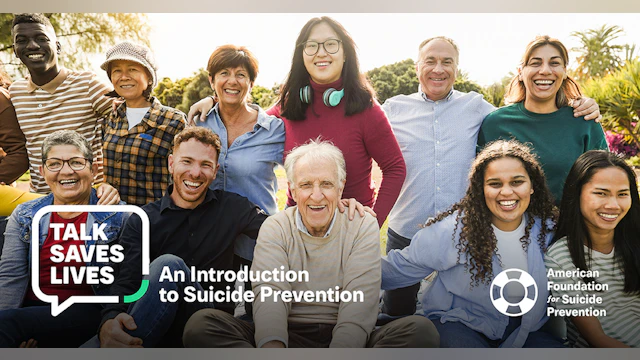Suicide is the 11th leading cause of death in the U.S., and the American Foundation for Suicide Prevention (AFSP) has long been on the forefront of developing and delivering suicide prevention education to communities across the country to save lives. Talk Saves Lives: An Introduction to Suicide Prevention is AFSP’s flagship community-based presentation that offers guidance on what people can do to prevent suicide. Since its initial launch in 2015, Talk Saves Lives has reached nearly 240,000 people.
Since that time, the landscape of suicide prevention has evolved. There is an increased demand for programs like Talk Saves Lives as the nation has focused on the importance of taking care of our mental health and talking to others about suicide. Since COVID-19, much has shifted and there was a need to revamp the program to better meet the needs of diverse communities, integrate the latest research, and foster a more dynamic and inclusive learning experience for program participants.
In addition, rates of suicide are on the rise in a variety of populations in the U.S., including Veterans, Black, Indigenous, and people of color, Asian American and Pacific Islander youth, people who live in rural areas, older adults, workers in certain industries and occupations like mining and construction, and more. Young people who identify as lesbian, gay, bisexual, and/or transgender have higher prevalence of suicidal thoughts and behavior compared to their peers who identify as heterosexual. More people should be able to see themselves in the program and be encouraged to start conversations about mental health and save lives in their communities.
To guide the process of updating the program, AFSP’s Impact Measurement team conducted a needs assessment using a mixed method approach (focus groups and a survey) seeking feedback from AFSP chapter staff and volunteers in local chapters across the country. Through this comprehensive evaluation, AFSP learned that while people appreciated the program length and detail, there were gaps on how to begin a conversation about suicide with someone they are concerned about; information about self-care; and inclusion of how suicide affects certain communities differently.
With these considerations in mind, the collected feedback was incorporated and can be found in the newly refreshed Talk Saves Lives. The program now weaves in themes of diversity and inclusion throughout its entirety, from the design and pictures chosen to the data shared. It also features a customizable, flexible, interactive, and inclusive presentation and design, with optional activities, slides, and videos for presenters to use to tailor the presentation to more targeted audiences in a variety of settings (e.g. LGBTQ+ communities, older adults, firearm owners, workplaces, etc.).
The presentation includes:
Scope of the Problem: The latest data on suicide in the U.S., including differences in data among various communities.
Research: The latest information from research on what causes people to consider suicide, how certain communities are impacted by suicide differently, contributors to suicide risk, and suicide warning signs.
Prevention: An understanding of the protective factors that lower suicide risk, strategies for managing mental health and being proactive about self-care, and how to proactively create a safe environment for those at risk.
What You Can Do: Guidance on warning signs and behaviors to look for, how to start a conversation with someone you are concerned about, and ways to seek and offer support and crisis resources for yourself or others.
The success of the Talk Saves Lives program –– which is available through local AFSP chapters, for colleges and universities, workplaces and other community settings –– hinges on the dedication of its presenters: and so in addition to updating the presentation itself, AFSP has revamped the training provided to volunteer presenters to better equip them with facilitation skills, knowledge about suicide prevention, and a deeper understanding of the program content and questions that may arise from audience members. AFSP offers training for presenters' classes for all those interested in bringing this program to their communities.
As of August 2024, the newly revamped Talk Saves Lives is available in all chapters across the U.S., Washington D.C., and Puerto Rico! Connect with your local chapter at afsp.org/chapters to request a program, become a trained presenter, or register to attend an in-person or virtual presentation at afsp.org/calendar.
Learn more about AFSP’s Talk Saves Lives program.
